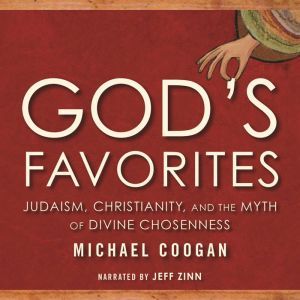

God's Favorites
Judaism, Christianity, and the Myth of Divine Chosenness
Author: Michael Coogan
Narrator: Jeff Zinn
Unabridged: 5 hr 39 min
Format: Digital Audiobook Download
Publisher: Beacon Press
Published: 04/02/2019
Synopsis
The Bible describes many individuals and groups as specially chosen by God. But does God choose at all? Michael Coogan explains the temporally layered and allusive storytelling of biblical texts and describes the world of the ancient Near East from which it emerged, laying bare the power struggles, the acts of vengeance, and persecutions made sacred by claims of chosenness.
Jumping forward to more modern contexts, Coogan reminds us how the self-designation of the Puritan colonizers of New England as God’s new Israel eventually morphed, in the United States, into the self-justifying doctrines of manifest destiny and American exceptionalism. In contemporary Israel, both fundamentalist Zionists and their evangelical American partners cite the Jews’ status as God’s chosen people as justification for taking land—for very different ends. Appropriated uncritically, the Bible has thus been used to reinforce exclusivity and superiority, with new myths based on old myths.
Finally, in place of the pernicious idea of chosenness, Coogan suggests we might instead focus on another key biblical concept: taking care of the immigrant and the refugee, reminding the reader of the unusual focus on the vulnerable in both the Hebrew Bible and New Testament.

